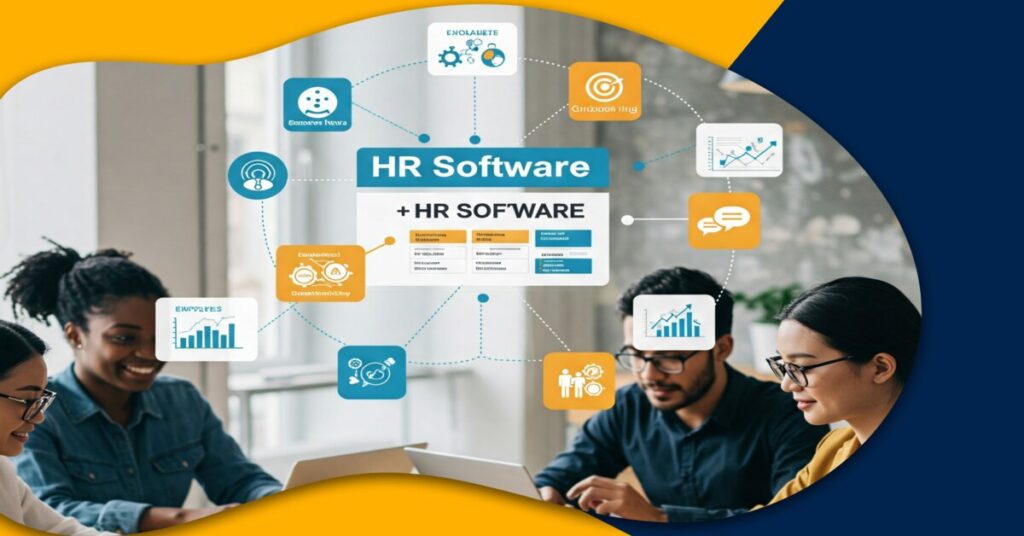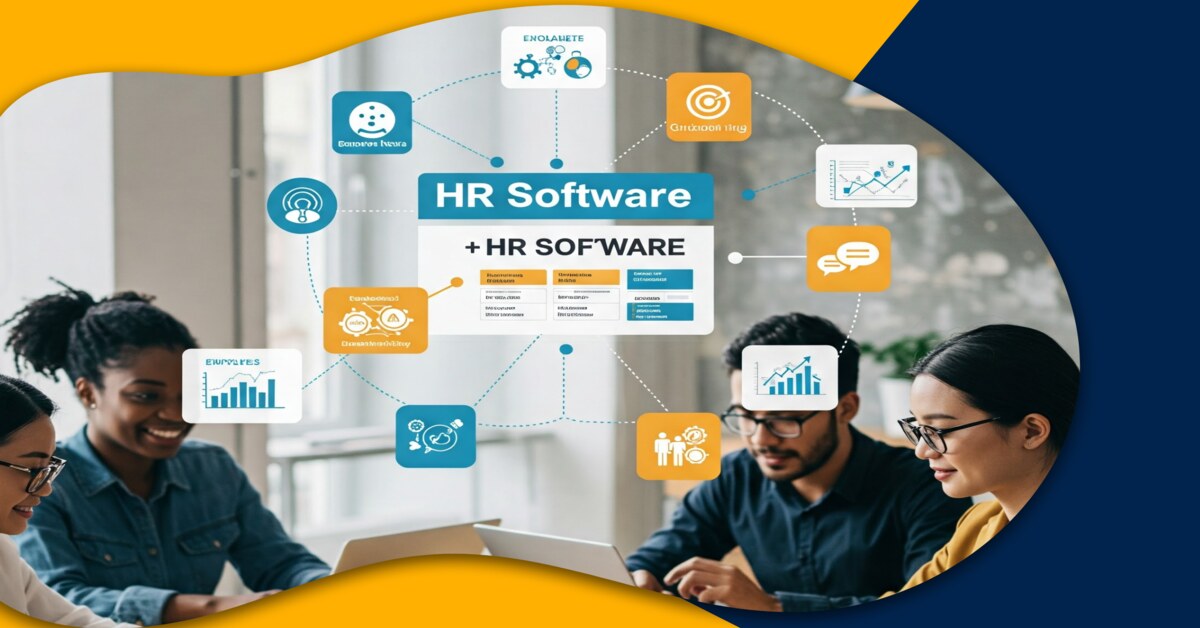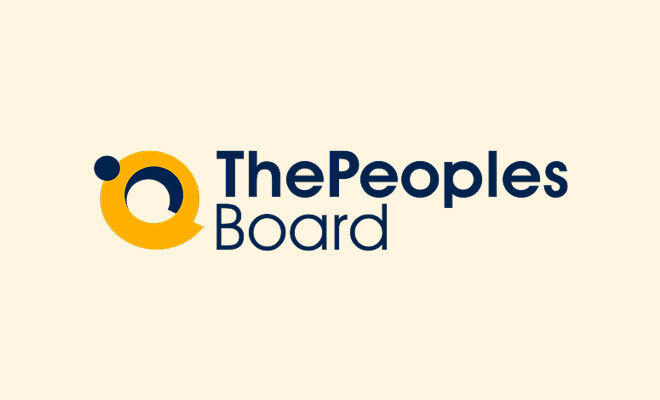Managing human resources efficiently is a cornerstone of organizational success in today’s fast-paced corporate world. With tasks like recruitment, payroll, performance management, and employee engagement becoming increasingly complex, investing in the right HR software is more crucial than ever.
The benefits of HR software include streamlining administrative tasks, which allows HR professionals to focus on strategic responsibilities, thereby enhancing overall productivity.
The right HR software isn’t just about automation—it must cater to specific needs like compliance with Indian labor laws, multilingual support, and scalability for rapidly growing companies.
What is HR Software?
HR software, also known as a Human Resource Management System (HRMS), is a digital solution designed to manage and optimize daily human resources tasks and overall HR goals of an organization.
This comprehensive platform automates manual tasks, keeps employee information organized, and generates data-driven reports electronically. By integrating various HR functions into a single system, HR software helps streamline processes, reduce administrative burden, and improve overall efficiency.
Importance in Modern HR Management
In the world of modern HR management, HR software has become indispensable. It enables organizations to streamline their HR processes, enhance employee engagement, and boost productivity.
With a centralized system for managing employee data, payroll, benefits, time-off, performance management, and other HR-related tasks, HR software ensures that HR teams can focus on strategic initiatives rather than getting bogged down by administrative duties. This not only improves operational efficiency but also fosters a more engaged and satisfied workforce.
Overview of the HR Software Market
The HR software market has seen significant evolution over the years, offering a wide range of solutions tailored to different organizational needs. Whether you are a small to medium-sized business or a large enterprise, there is an HR software solution designed to meet your specific requirements.
The market is predominantly dominated by cloud-based solutions, which provide greater accessibility, flexibility, and scalability. These solutions allow organizations to manage their HR functions from anywhere, at any time, making them ideal for the modern, dynamic workplace.
Why is HR Software Important?
HR software simplifies and automates repetitive tasks, enabling HR teams to focus on strategic goals. Here’s why it matters:
Improves Efficiency
HR software can automate key features like attendance tracking, payroll processing, and leave management. This can significantly reduce the time spent on these tasks, allowing the HR professionals to focus on other responsibilities.
Enhances Employee Experience
HR software often offer self-service portals to access information and manage HR needs. This greatly increase the ease with which employees can access necessary information.
Ensures Compliance
Through HR Software, organization can remain aligned with Indian labor laws and tax regulations. Different types of HR software can help ensure compliance by offering functionalities tailored to these specific needs.
Supports Data-Driven Decisions
With all the information at its fingertips, HR software can provide analytics and insights into workforce trends, helping in strategic planning. The insights provided by these platforms are generally easy to implement and are geared towards increasing efficiency.
Facilitates Remote Work
With the rise of hybrid and remote work models, HR software has become more relevant than ever. Thanks to this piece of technology, employees and HR professionals can easily communicate and access necessary information.
Understanding Your HR Needs
Identify Your Needs and Bottlenecks
To choose the right HR software, it is crucial to understand your organization’s HR needs and identify the bottlenecks in your current HR processes. Start by analyzing your business needs, industry, culture, company size, and budget. Consider your company’s growth plans and future needs to ensure the software you choose can scale with your organization.
Here are some questions to help you identify your HR needs:
- What are the most time-consuming HR tasks in our organization?
- What are the biggest challenges facing our HR department?
- What are our HR goals and objectives?
- What features do we need in an HR software solution?
- What is our budget for HR software?
By answering these questions, you can create a comprehensive list of your HR needs and bottlenecks. This list will serve as a guide to help you choose the best HR software for your organization, ensuring it aligns with your specific requirements and supports your strategic HR goals.
Steps to Choose the Right HR Software

Identify Your Needs
Before exploring options, create a list of specific challenges your HR team faces.
- Are you struggling with payroll calculations due to frequent regulatory changes?
- Do you need better tools for recruitment and onboarding?
- Is employee engagement a priority?
Categorize your needs into must-have features (e.g., compliance tools, payroll management) and nice-to-have features (e.g., AI-powered analytics, mobile app integration).
Understand Your Budget
Indian companies, especially small and medium-sized enterprises (SMEs), often operate with tight budgets. Choose software that offers value for money without compromising on essential features. Look for:
- Transparent pricing models.
- Scalability to avoid outgrowing the software as your business expands.
- Affordable options for startups or smaller organizations.
Evaluate Core Features
When comparing HR software, ensure it includes these essential features tailored for Indian businesses:
- Payroll Management: Automatic compliance with Indian tax laws (PF, ESI, TDS).
- Attendance and Leave Tracking: Integration with biometric devices or mobile apps for seamless tracking.
- Recruitment and Onboarding: Tools for job postings, candidate tracking, and onboarding processes.
- Employee Self-Service: Portals where employees can access payslips, apply for leaves, and update their details.
- Compliance Tools: Built-in support for Indian labor laws like the Shops and Establishments Act, Payment of Wages Act, and Maternity Benefits Act.
- Analytics and Reporting: Dashboards and reports for workforce trends, attrition rates, and performance metrics.
Prioritize User-Friendliness
The software should be easy for your HR team and employees to use. Complex systems often lead to underutilization. Look for:
- Intuitive interfaces with minimal learning curves.
- Customization options to align the software with your company’s workflows.
- Mobile compatibility, especially for a tech-savvy workforce.
Check Scalability and Flexibility
As your company grows, your HR needs will evolve. Choose software that can:
- Scale to accommodate more users and additional features.
- Adapt to industry-specific requirements, such as compliance with sectoral labor laws.
Assess Vendor Support
Reliable customer support is critical, especially for Indian companies needing assistance navigating compliance and technical issues. Evaluate:
- Availability of customer support (24/7, regional languages, etc.).
- Training options for your HR team.
- Online resources like FAQs, tutorials, and community forums.
Test with a Free Trial or Demo
Most HR software providers offer free trials or live demos. Use this opportunity to:
- Test critical features and assess ease of use.
- Evaluate how the software integrates with existing tools like accounting or CRM systems.
- Gather feedback from HR team members and potential end-users.
Common Mistakes to Avoid
- Overlooking Scalability: Choosing software that cannot grow with your company’s needs.
- Ignoring Employee Feedback: Employees are the end-users of many HR tools; their input is valuable.
- Focusing Solely on Cost: While budget matters, compromising on features can lead to inefficiencies.
- Skipping Integration Checks: Ensure the software integrates seamlessly with existing systems.
Benefits of Choosing the Right HR Software
When chosen correctly, HR software can help the organization in multiple ways.
Streamlined Processes
Thanks to the organized nature of HR software, manual work is reduced significantly, saving time and effort. This increase in efficiency can boost employee performance significantly.
Better Decision-Making
HR software is an expert in analyzing an organization’s data and offers insights for workforce planning and management. The data-driven decisions focus on specific metrics that need to be addressed.
Improved Employee Satisfaction
The accessible and transparent nature of HR platforms fosters trust and satisfaction. This boosts the employee satisfaction metric and helps them feel connected with the organization.
Regulatory Compliance
HR platforms significantly minimizes risks associated with non-compliance with Indian labor laws. They keep track of all the applicable laws and regulations and highlight any factor that might not be compliant.
Key Considerations for Businesses
When selecting an HR platform for your company, there are certain non-performance factors that should also be kept in mind.
Compliance with Indian Laws
Ensure that the HR software supports regulations like GST, TDS, and labor laws. The platform should be compliant with the applicable laws and remain on top of any and all changing regulations.
Language Support
Multilingual options are essential for businesses with a diverse workforce. Given the diversity of language in India, having multiple language options significantly boosts the platform’s accessibility.
Affordability
Many Indian companies prefer subscription-based pricing over one-time costs. As such, workforce requirement and budgetary constraints should be kept in mind when making any decision regarding the purchase.
Conclusion
Choosing the right HR software is an investment in your company’s future. For Indian businesses, the ideal software balances cost-effectiveness, compliance, and usability. By following the steps outlined above—understanding your needs, evaluating features, and testing software—you can make an informed decision that drives efficiency and employee satisfaction.
Remember, HR software is not just a tool; it’s a strategic partner in managing your most valuable asset—your people. Take the time to choose wisely; your organization will benefit from a happier, more productive workforce.






